China News Service, September 24, reported that Japanese Minister of Foreign Affairs Toshimitsu Motegi and South Korean Foreign Minister Zheng Yirong were attending the United Nations General Assembly in New York, USA. The two held bilateral talks on the sidelines.
However, during the meeting, both sides said different things on the issue of forced labor and comfort women that caused tensions between Japan and South Korea, and the discussion did not make progress.
According to reports, Toshimitsu Motegi and Zheng Yi dissolved in the evening of the 23rd, Japan time, and held talks for about 50 minutes.
During the meeting, the issue of comfort women and the “requisition of labor” (Japanese companies forcibly recruiting Korean labor) during World War II was discussed. Motegi reiterated that these two issues are the responsibility of South Korea and should propose appropriate response methods; Zheng Yirong only reiterated South Korea's position, the discussion between the two sides has not made progress.
On September 22, local time, the unveiling ceremony of the comfort woman statue was held at St. Mary's Square in San Francisco, USA. This is also the first comfort woman statue in a major major city in the United States.
On the left is Lee Young-soo, a South Korean comfort woman survivor.
Photo by China News Agency reporter Liu Dan
However, the two sides agreed that in order to restore Japan-South Korea relations and cooperate in various fields, the two sides will enhance personnel exchanges.
Japan and South Korea have long-term tensions over issues of comfort women and forced labor.
In October 2018, the South Korean Supreme Court supported the claims of four South Korean workers who were forcibly recruited by Japan during World War II, and ruled that the Japanese companies involved should compensate each plaintiff with 100 million won.
Subsequently, many cases of forced labor conscription were pronounced, and the judgments aroused strong dissatisfaction from the Japanese side.
In July 2019, Japan announced restrictions on the export of some semiconductor materials to South Korea.
South Korean officials and public opinion believe that this is an economic retaliation by Japan against South Korea after the South Korean Supreme Court's judgment on the "Forced Labor Claims Case".

